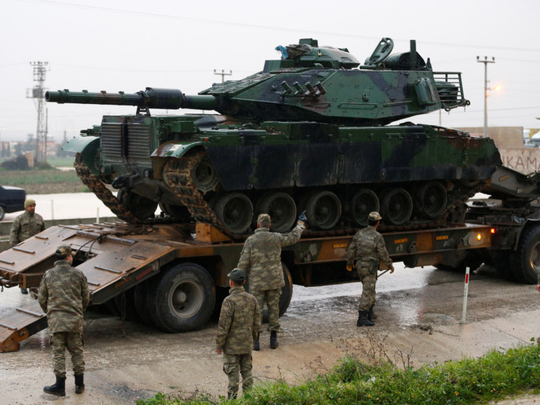
Beirut: The Trump administration is backtracking on its description of a planned new security force in northeastern Syria amid escalating threats by Turkey to launch a cross-border assault against the Kurdish group involved.
US officials had originally described it as a “Border Security Force” that would guard the perimeter of an emerging Kurdish enclave taking shape in northeastern Syria.
Reports of the planned new force provoked an outcry in Turkey, whose leaders have long accused the United States of enabling terrorism by supporting the Kurds in Syria.
Turkey has meanwhile dispatched tanks and troops to the Syrian border, where they appear poised to launch an attack on a Kurdish-controlled enclave outside an area where the United States maintains troops.
Confronted with the prospect of an imminent war that could draw in the United States and force Washington to choose between two important allies, US officials have been hastily recalibrating their descriptions of the force.
The force “was not properly described,” Secretary of State Rex Tillerson told reporters on Wednesday after meeting with Turkish Foreign Minister Mevlut Cavusoglu in Vancouver.
“It’s unfortunate that entire situation has been mis-portrayed, mis-described, some people misspoke,” he said.
“We are not creating a border security force at all.”
Rather, he said, the US military will provide training to local elements to help secure areas that were liberated from Daesh, with US assistance, over the past three years.
The US military said in a statement emailed to journalists that the force would be “internally focused.”
“This is not a new ‘army’ or conventional ‘border guard’ force,” the statement said.
“These security forces are internally-focused to prevent Daesh fighters from fleeing Syria.
These forces will augment local security in liberated areas and protect local populations,” the statement said.
Whether the semantics will be enough to head off the threatened Turkish assault on the Kurdish enclave of Afrin is unclear.
Turkey has been warning for more than a year that it will attack the enclave in northwest Syria, as well as eventually the entire Kurdish-controlled northeast to prevent the YPG establishing a permanent presence on its borders.
The United States is “keenly aware of the legitimate security concerns of Turkey, a member of the Global Coalition and a NATO ally,” the US military statement said.
Cavusoglu cautioned after his meeting however that the damage to US-Turkish relations caused by the crisis may prove “irreversible.”
He also indicated that “different opinions” within the Pentagon and between the military and the State Department over US support for the SDF may have been responsible for “causing problems,” according to comments quoted by Turkey’s Anadolu news agency.
Part of the confusion is rooted in a lack of coordination in Washington between the different branches of the administration involved in the war on Daesh, said Nicholas Heras of the Washington-based Centre for a New American Security.
“The Afrin crisis shows how difficult it is for US policymakers to walk and chew gum when it comes to Syria,” he said. “This is shoot from the hip policymaking.”
Turkey said on Thursday it was not satisfied with Washington’s attempts to allay its concern about the creation of the force adding that its “direct mistrust” of the United States continued.
“We voiced our discomfort in the meetings we held with the Secretary of Defence and the Secretary of State ... However, the United States’ statements did not fully satisfy us,” Cavusoglu told broadcaster CNN Turk in an interview.
“Our direct mistrust of the United States continues ... We need to see concrete steps from the United States.”
Cavusoglu reiterated Turkey’s warning that it would intervene militarily in the Kurdish-controlled Afrin region close to the Turkish border, and said he had told the United States that Ankara did not want to face an ally there.
“We will intervene in Afrin. We will also take steps to the east of the Euphrates against threats,” Cavusoglu said.












